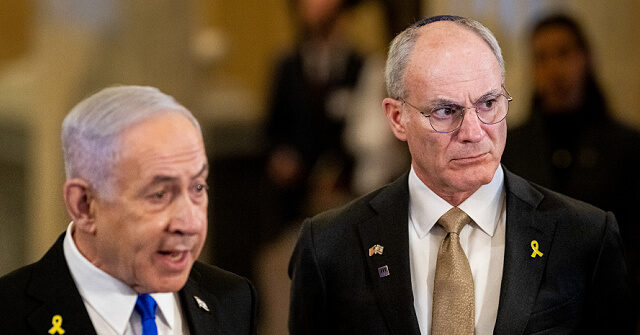Israel’s Ambassador to the United States, Yechiel Leiter, delivered a scathing rebuke Wednesday of the New York Times‘ misleading front-page Gaza photo, calling it part of a “well-funded propaganda campaign to demonize and delegitimize the state of Israel and the Jewish people” that reached “perhaps hundreds of millions of people.”
The ambassador’s fiery remarks came in response to the Times‘ quiet correction this week regarding its widely-circulated front-page photograph of an emaciated Gaza child, which the paper had used to illustrate alleged Israeli-caused starvation but later admitted showed a boy suffering from cerebral palsy and other pre-existing medical conditions.
“By now everyone knows about the story on the front page of the New York Times, ‘all the news that’s fit to print,’ about a little boy by the name of Muhammad being held by his mother, it’s a heart-wrenching picture,” Leiter said in his statement posted on X. “The accusation made against Israel was that it was starving this little boy, and the little boy was dying because of that starvation.”
The ambassador noted the stark disparity between the reach of the original false narrative versus the correction: “Well, that publication, that photograph, reached perhaps hundreds of millions of people, at the very least 55 million people on the platform of the New York Times. When it was shown that that was one big lie, that the little boy was actually suffering from cerebral palsy, and that was the cause of his disfiguration, not malnutrition, the New York Times issued a mealy-mouthed, whimpering retraction, well, not really a retraction, just a correction of the story. That correction, so to speak, reached 50,000 people.”
Leiter emphasized that “the bloodletting was done” and “the demonization of Israel was accomplished” before the minimal correction reached a fraction of those who saw the original misleading story.
The ambassador revealed additional deception in the Times‘ presentation, explaining that the newspaper had deliberately cropped out crucial context from the photograph. “But in that correction, the New York Times didn’t show you the real picture, which was doctored by journalists. Here’s Muhammad being held by his mother. Blocked out of the picture that was shown in the New York Times was his brother,” Leiter said.
“So how is it that this nice, healthy, young boy, the brother of Muhammad, is not being starved by Israel, but only Muhammad is being starved by Israel?” the ambassador asked pointedly.
Leiter drew parallels between the current anti-Israel media atmosphere and historical mass hysteria, urging Americans not to fall prey to what he characterized as manufactured outrage. “I appeal to you don’t accept the propaganda of the legacy media. This is a social contagion. It is hysteria that is being fueled by social contagion. Google, ‘the satanic panic’ of the 1980s,” he said.
“That’s what we’re facing now, except Israel is being branded as the Satan. And now we’re dealing with an age of TikTok, where everything moves quickly, where people receive their information through digital and social media very quickly and very fast.”
The ambassador warned that the coordinated campaign against Israel has adapted to modern information warfare tactics. “So this well-funded propaganda campaign to demonize the state of Israel is moving swiftly,” Leiter said, before urging Americans to “stand firm” and “seek the truth.”
The Gaza photo controversy first emerged after questions were raised about the widely-circulated image of emaciated child Muhammad Zakaria al-Mutawaq. The watchdog group Honest Reporting highlighted inconsistencies in the photo set, noting that another child in the background — reportedly Muhammad’s older brother — appeared well-nourished and healthy. In a CNN report, the boy’s mother explained that Muhammad suffers from a muscle disorder requiring ongoing physical therapy and specialized nutrition. The Times subsequently added an editor’s note acknowledging the child had “pre-existing health problems affecting his brain and his muscle development,” though the correction reached far fewer people than the original misleading story.
Critics across social media platforms have seized on the incident as emblematic of biased reporting against Israel. The controversy has sparked renewed debate about media responsibility and the rapid spread of unverified narratives in the digital age.
Leiter, who assumed his ambassadorial post in January 2025, concluded his statement with a direct appeal to Americans: “Appeal to us, and we will send you the real information that you’re not gonna get from the New York Times.”
The ambassador’s forceful response reflects growing Israeli frustration with what officials view as systematically biased coverage of the ongoing conflict, particularly regarding humanitarian conditions in Gaza and Israel’s military operations.
Joshua Klein is a reporter for Breitbart News. Email him at [email protected]. Follow him on Twitter @JoshuaKlein.
Read the full article here
